祈使句 情态动词游戏
- 格式:docx
- 大小:13.89 KB
- 文档页数:1
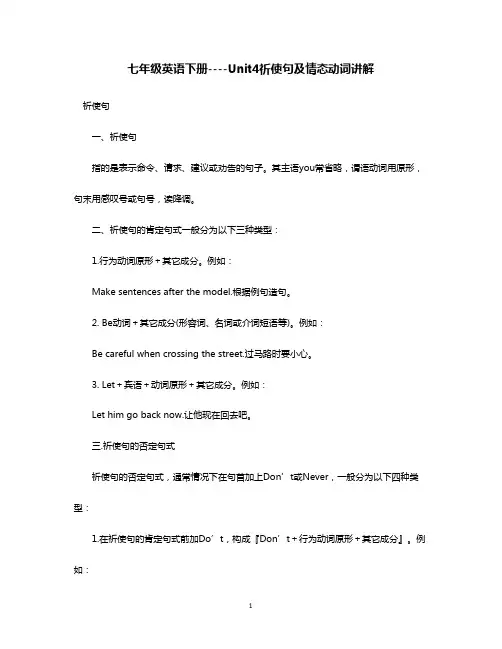
七年级英语下册----Unit4祈使句及情态动词讲解祈使句一、祈使句指的是表示命令、请求、建议或劝告的句子。
其主语you常省略,谓语动词用原形,句末用感叹号或句号,读降调。
二、祈使句的肯定句式一般分为以下三种类型:1.行为动词原形+其它成分。
例如:Make sentences after the model.根据例句造句。
2. Be动词+其它成分(形容词、名词或介词短语等)。
例如:Be careful when crossing the street.过马路时要小心。
3. Let+宾语+动词原形+其它成分。
例如:Let him go back now.让他现在回去吧。
三.祈使句的否定句式祈使句的否定句式,通常情况下在句首加上Don’t或Never,一般分为以下四种类型:1.在祈使句的肯定句式前加Do’t,构成『Don’t+行为动词原形+其它成分』。
例如:Don’t say that again!别再那样说了!2.在Be动词引起的肯定祈使句前加Don’t,构成『Don’t be+其它成分(形容词、名词或介词短语等)』。
例如:Don’t be careless.不要粗心。
注意:在这种句型中be不能省略;否定副词not不可置于be之后。
3. Let引起的祈使句的否定形式有两种:(1)Let开头的祈使句,如果后面跟第一、第三人称名词或代词的宾格,可在Let前加Don’t,也可在Let后宾格的名词或代词后面加not。
(2)如果以Let’s开头的祈使句,必须在Let’s后加not。
例如:Don’t let me go with her tomorrow. =Let me not go with her tomorrow.不要让我明天跟她一起去。
Let’s not tell her the truth whenever we meet her.无论什么时候我们碰到她,都不要告诉她真相。
4.在公共场合的提示语中,否定祈使句常用『No+名词/V-ing形式』结构,表示『禁止做某事』。
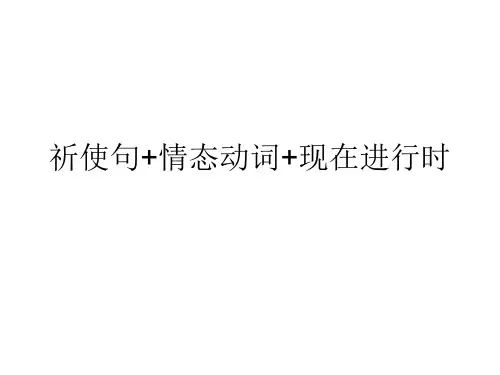
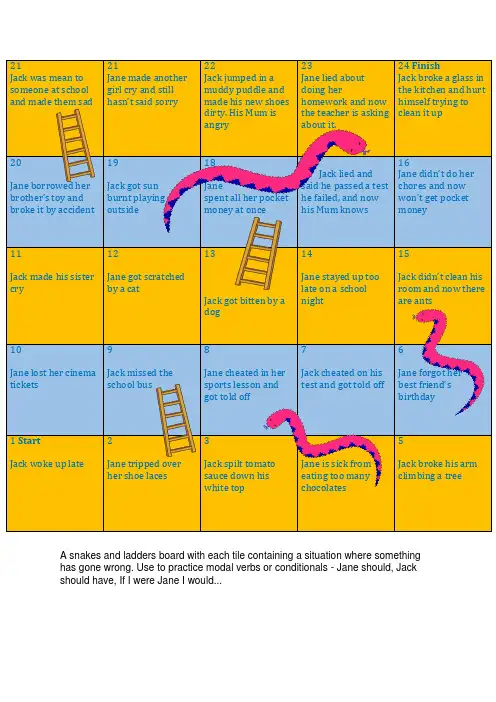
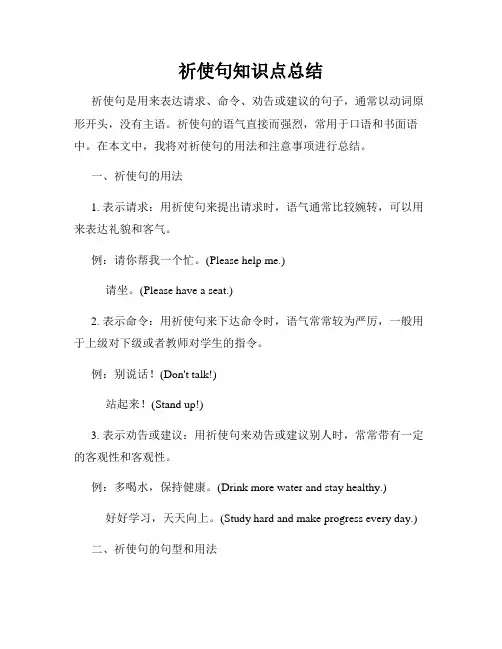
祈使句知识点总结祈使句是用来表达请求、命令、劝告或建议的句子,通常以动词原形开头,没有主语。
祈使句的语气直接而强烈,常用于口语和书面语中。
在本文中,我将对祈使句的用法和注意事项进行总结。
一、祈使句的用法1. 表示请求:用祈使句来提出请求时,语气通常比较婉转,可以用来表达礼貌和客气。
例:请你帮我一个忙。
(Please help me.)请坐。
(Please have a seat.)2. 表示命令:用祈使句来下达命令时,语气常常较为严厉,一般用于上级对下级或者教师对学生的指令。
例:别说话!(Don't talk!)站起来!(Stand up!)3. 表示劝告或建议:用祈使句来劝告或建议别人时,常常带有一定的客观性和客观性。
例:多喝水,保持健康。
(Drink more water and stay healthy.)好好学习,天天向上。
(Study hard and make progress every day.)二、祈使句的句型和用法1. 一般祈使句:即动词原形开头的句子,表示请求、命令、劝告或建议。
例:开门。
(Open the door.)停下来。
(Stop.)2. 祈使句+and:用祈使句开头,接着使用and引出具体的建议或者命令。
例:关上窗户,然后打开空调。
(Close the window and turn on the air conditioner.)写完作业,然后再玩游戏。
(Finish your homework and then play games.)3. 祈使句+or:用祈使句开头,接着使用or引出可选择的两个或多个指令。
例:走路去学校,或者骑自行车去学校。
(Go to school on foot or ride a bike.)吃饭前洗手,或者使用消毒液清洁双手。
(Wash your hands before meals or use hand sanitizer.)4. Let's...:以"Let's"开头的祈使句用于表示邀请或建议,包含了发出命令的意味。
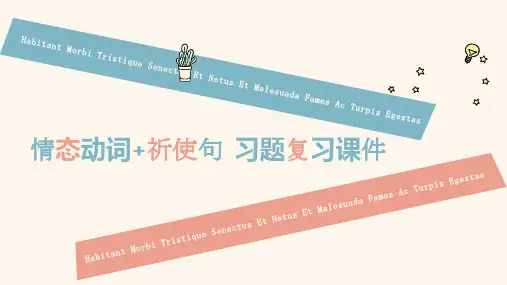
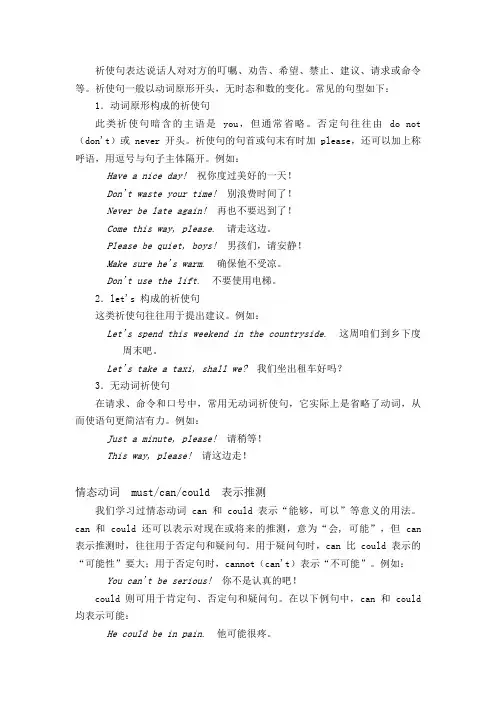
祈使句表达说话人对对方的叮嘱、劝告、希望、禁止、建议、请求或命令等。
祈使句一般以动词原形开头,无时态和数的变化。
常见的句型如下:1.动词原形构成的祈使句此类祈使句暗含的主语是 you,但通常省略。
否定句往往由 do not (don't)或 never 开头。
祈使句的句首或句末有时加 please,还可以加上称呼语,用逗号与句子主体隔开。
例如:Have a nice day! 祝你度过美好的一天!Don't waste your time! 别浪费时间了!Never be late again! 再也不要迟到了!Come this way, please. 请走这边。
Please be quiet, boys! 男孩们,请安静!Make sure he's warm. 确保他不受凉。
Don't use the lift. 不要使用电梯。
2.let's 构成的祈使句这类祈使句往往用于提出建议。
例如:Let's spend this weekend in the countryside. 这周咱们到乡下度周末吧。
Let's take a taxi, shall we? 我们坐出租车好吗?3.无动词祈使句在请求、命令和口号中,常用无动词祈使句,它实际上是省略了动词,从而使语句更简洁有力。
例如:Just a minute, please! 请稍等!This way, please! 请这边走!情态动词must/can/could 表示推测我们学习过情态动词 can 和 could 表示“能够,可以”等意义的用法。
can 和 could 还可以表示对现在或将来的推测,意为“会, 可能”,但 can 表示推测时,往往用于否定句和疑问句。
用于疑问句时,can 比 could 表示的“可能性”要大;用于否定句时,cannot(can't)表示“不可能”。
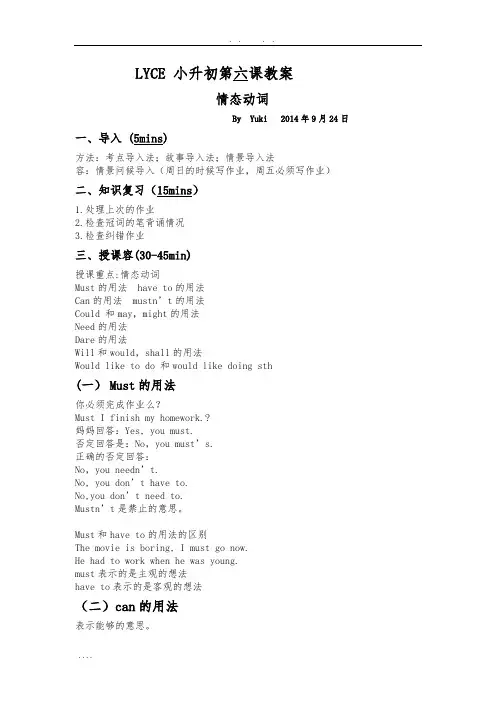
LYCE 小升初第六课教案情态动词By Yuki 2014年9月24日一、导入 (5mins)方法:考点导入法;故事导入法;情景导入法容:情景问候导入(周日的时候写作业,周五必须写作业)二、知识复习(15mins)1.处理上次的作业2.检查冠词的笔背诵情况3.检查纠错作业三、授课容(30-45min)授课重点:情态动词Must的用法 have to的用法Can的用法 mustn’t的用法Could 和may,might的用法Need的用法Dare的用法Will和would,shall的用法Would like to do 和would like doing sth(一)Must的用法你必须完成作业么?Must I finish my homework.?妈妈回答:Yes, you must.否定回答是:No,you must’s.正确的否定回答:No,you needn’t.No, you don’t have to.No,you don’t need to.Mustn’t是禁止的意思。
Must和have to的用法的区别The movie is boring, I must go now.He had to work when he was young.must表示的是主观的想法have to表示的是客观的想法(二)can的用法表示能够的意思。
I can swim.What can I do?以前有个孩子回答:I can speak.表示征求意见Can I do my homework now?Yes, you can.No, you can’t.去车站的时候,放行的时候You can put your luggage here.这里的can表示建议。
Must n’tCan I smoke here?No, you mustn’t.you can’t.can’t 的语气比mustn’t弱一点。
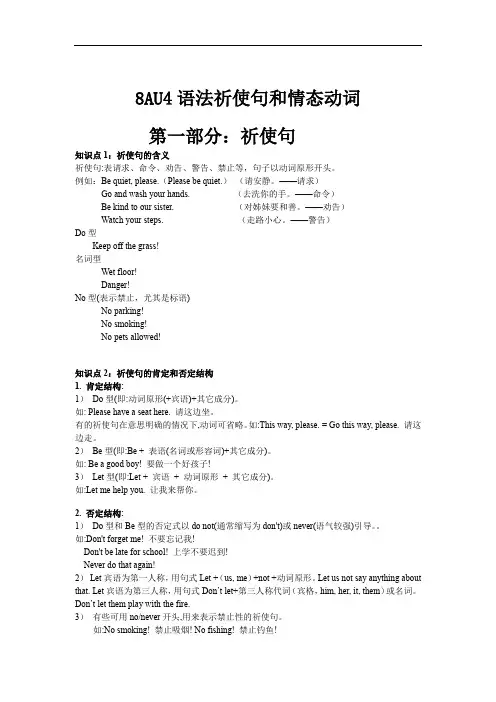
8AU4语法祈使句和情态动词第一部分:祈使句知识点1:祈使句的含义祈使句:表请求、命令、劝告、警告、禁止等,句子以动词原形开头。
例如:Be quiet, please.(Please be quiet.)(请安静。
——请求)Go and wash your hands. (去洗你的手。
——命令)Be kind to our sister. (对姊妹要和善。
——劝告)Watch your steps. (走路小心。
——警告)Do型Keep off the grass!名词型Wet floor!Danger!No型(表示禁止,尤其是标语)No parking!No smoking!No pets allowed!知识点2:祈使句的肯定和否定结构1. 肯定结构:1)Do型(即:动词原形(+宾语)+其它成分)。
如: Please have a seat here. 请这边坐。
有的祈使句在意思明确的情况下,动词可省略。
如:This way, please. = Go this way, please. 请这边走。
2)Be型(即:Be + 表语(名词或形容词)+其它成分)。
如: Be a good boy! 要做一个好孩子!3)Let型(即:Let + 宾语+ 动词原形+ 其它成分)。
如:Let me help you. 让我来帮你。
2. 否定结构:1)Do型和Be型的否定式以do not(通常缩写为don't)或never(语气较强)引导。
如:Don't forget me! 不要忘记我!Don't be late for school! 上学不要迟到!Never do that again!2)Let宾语为第一人称,用句式Let +(us, me)+not +动词原形。
Let us not say anything about that. Let宾语为第三人称,用句式Don’t let+第三人称代词(宾格,him, her, it, them)或名词。
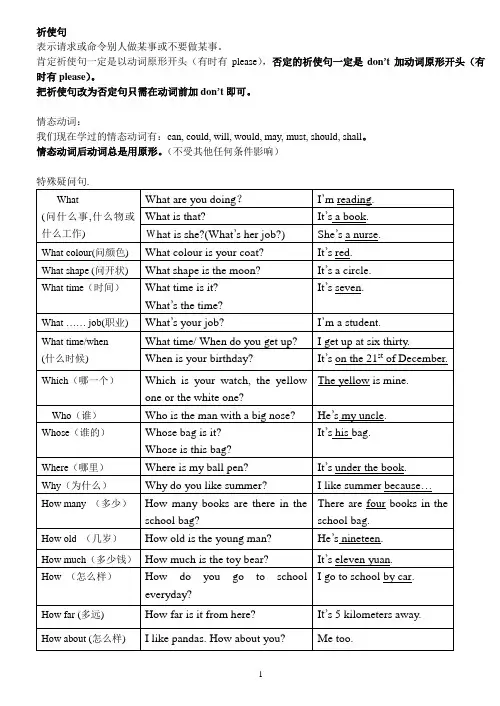
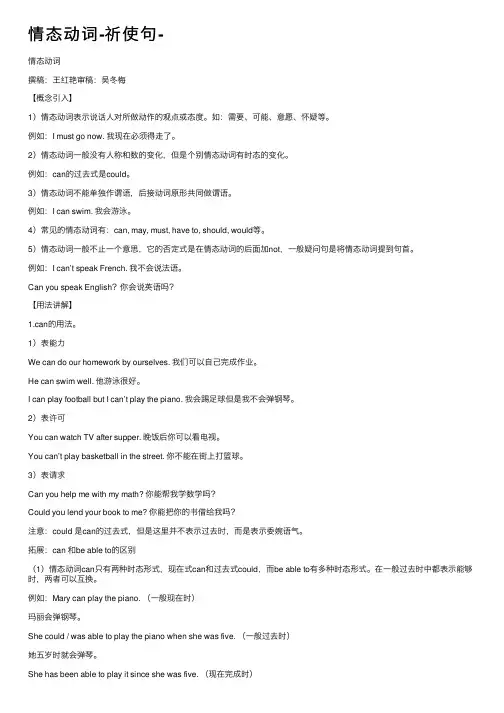
情态动词-祈使句-情态动词撰稿:王红艳审稿:吴冬梅【概念引⼊】1)情态动词表⽰说话⼈对所做动作的观点或态度。
如:需要、可能、意愿、怀疑等。
例如:I must go now. 我现在必须得⾛了。
2)情态动词⼀般没有⼈称和数的变化,但是个别情态动词有时态的变化。
例如:can的过去式是could。
3)情态动词不能单独作谓语,后接动词原形共同做谓语。
例如:I can swim. 我会游泳。
4)常见的情态动词有:can, may, must, have to, should, would等。
5)情态动词⼀般不⽌⼀个意思,它的否定式是在情态动词的后⾯加not,⼀般疑问句是将情态动词提到句⾸。
例如:I can’t speak French. 我不会说法语。
Can you speak English?你会说英语吗?【⽤法讲解】1.can的⽤法。
1)表能⼒We can do our homework by ourselves. 我们可以⾃⼰完成作业。
He can swim well. 他游泳很好。
I can play football but I can’t play the piano. 我会踢⾜球但是我不会弹钢琴。
2)表许可You can watch TV after supper. 晚饭后你可以看电视。
You can’t play basketball in the street. 你不能在街上打篮球。
3)表请求Can you help me with my math? 你能帮我学数学吗?Could you lend your book to me? 你能把你的书借给我吗?注意:could 是can的过去式,但是这⾥并不表⽰过去时,⽽是表⽰委婉语⽓。
拓展:can 和be able to的区别(1)情态动词can只有两种时态形式,现在式can和过去式could,⽽be able to有多种时态形式。
在⼀般过去时中都表⽰能够时,两者可以互换。
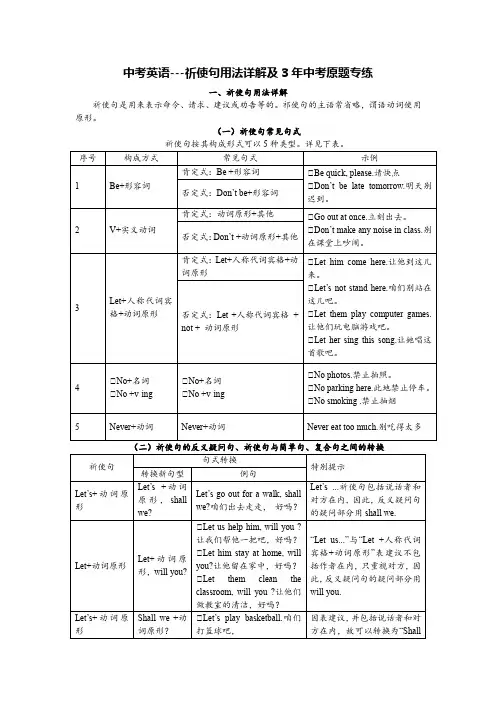
中考英语---祈使句用法详解及3年中考原题专练一、祈使句用法详解祈使句是用来表示命令、请求、建议或劝告等的。
祁使句的主语常省略,谓语动词使用原形。
(一)祈使句常见句式二、3年中考原题专练(一)单项选择2018年1.(重庆A卷)______ me a chance and I’ll bring you a surprise.A.GiveB.GivingC.GivesD.To give2.(上海)Please______the rubbish into different litter bins according to the signs.A.putsB.putC.puttingD.to put3.(贵州黔东南、黔南、黔西南)Life is like a journey. _______ ahead, and you will see a lot more beautiful sceneries(风景)A. PlanB. To planC. PlanningD. Plans4.(湖北恩施)---- _______, or you won’t do well in your lessons.---- OK. I will.A.Don’t work hardB. Work hardC. Hard work5.(河南)_____ everyone with politeness even those who are very rude to you, not because they are nice, but because you are.A.TreatB.TreatingC.TreatedD.To treat6.(四川凉山)----Mom, can I play computer games this evening?----your homework first, and then we'll talk about it.A.FinishingB. FinishC. To finishD. Finished7.(湖北襄阳)---Be quick, we'll fail to catch the school bus.---Don’t worry. It's only seven o'clock now. We still have enough time.A. andB. butC. orD. so8.(江苏盐城)Work hard. _______ you'll have a big success.A. orB. butC. andD. yet9.(黑龙江绥化)Work hard, ____________you'll catch up with your classmates next timeA. andB. orC. but10.(长春)Work hard and be patient, __________your dream won’t come true.A. orB. andC. butD. so2019年1.(2019呼和浩特)_____ me an email before you come to Hohhot , and I’ll meet you at the train station.A.SendB.SendingC.To sendD.Sent2.(2019广西桂林)_____ more books, and you will improve your reading skills.A.ReadingB.ReadC.Reads3.(2019青海)_____on the grass. It’s a rule of the park.A.StepB.Don’t stepC.To step4.(2019山东滨州)Emily, you are playing video games again! Study hard, ______ you will fail in the comingexam.A. thenB. soC. andD. or5.(2019江苏南京). “Put on your coat, you will catch a cold!” This is what my mum often says to me.A. andB. butC. orD. so6.(2019湖南长沙).Keep trying, ______ you might surprisingly find hidden abilities within you. A.but B.and C.or7.(2019贵州毕节)Bill, stop smoking, you’ll get better soon.A. butB. afterC. orD. and8.(2019黑龙江龙东地区)Hurry up, _____ you will miss the flight. There is _____ time left.A.or; littleB.and; a littleC.or; a little2020年1.(2020年甘肃天水)Let’s meet at the school gate, __________?A. shall weB. shall youC. will weD. will you2.(2020年青海)— What a fine day! Let’s go for a picnic, ________?— Sounds like a good idea.A. shall weB. don’t weC. can we3.(2020年贵州铜仁)—Work hard, ________your dream will come true.—Well. I will do my best.A. soB. butC. andD. or4.(2020年四川甘孜州)Get up early, _____________ you will miss your train.A. orB. andC. but5.(2020年北京)Wash your hands before meals,you may get ill.A. andB. butC. orD. so6.(2020年湖北咸宁)—My aim is to go to Wuhan University for further study.—Work hard, ___________ you can make it.A. ifB. soC. andD. unless7.(2020年吉林)Work hard, _____________ you will get good grades.A. orB. butC. and8.(2020年四川凉山)When I want to go out to play with my friends, my mother always says, “____________ at home. Don’t waste your time.”A. StayB. StaysC. To stayD. Staying9.(2020年黑龙江绥化)__________ walk on the grass.A. Doesn'tB. Don'tC. Not10.(2020年湖南湘西)Please ___________ the rubbish into different litter bins according to the signs.A. putB. putC. to put11.(2020年湖南长沙)______ your smartphones, and read for at least 30 minutes, every day! You know, reading helps us to deepen our spiritual world.A. Put awayB. To put awayC. Putting away12.(2020年辽宁营口)---_______ the dishes after dinner, Tony.---No problem, Mom.A.WashingB.WashesC.To washD.Wash13.(2020年上海)----Tom, _______here to carry the luggage upstairs for me,will you?----All right.eB.cameingD.to come14.(2020年湖南邵阳)---How can I avoid the illness, Sir?---__________ a mask when going out and wash hands with soap.A. WearsB. WearC. To wear(二)完成句子2018年1.(上海)Keep working hard, and you will achieve success.(保持句意不变)_____ ______ keep working hard, you will achieve success.2.(甘肃白银市)Could you please be there at 5:00 ?(改为祈使句)_______ _______ at 5:00 , please !3.(山东威海)Mike,别忘了告诉我咱们在哪里碰面。
第8次课祈使句及简单情态动词1.祈使句的用法通常用来表示命令、请求、禁止、建议、警告等语气,根据语气的强弱,在句末用叹号或句号,读时用将调。
它的主语you(听话人)通常省略。
其构成通常有以下几种形式。
1)Be型(即系动词原型be+表语+其他)。
如:Be quiet,please.否定句Don’t + be+表语+其他。
如:Don’t be angry.2)Do型(即动词原形+宾语+其他)。
如: Open you books,please.否定句Don’t +实义动词原形+宾语+其他。
如:Don’t eat in the classroom.3)Let型(即Let+宾语+动词原形+其他)如: Let me help you. Let’s go at six o’clock.否定句一般在宾语后加not。
如: Let’s not watch TV.Let作为动词常常用于祈使句,但表示意义并不相同。
①Let 表示“建议”,后面跟第一人称代词作宾语。
如:Let me try again. 让我再试一试。
②Let 表示“间接命令或愿望”,后面接第三人称代词作宾语。
如:Let him work out the problem by himself.4)No+V-ing型(此种形式通常用于公共场合的提示语中,意为“禁止做某事“)如:No smoking! 严禁吸烟! No talking! 不许交谈!5)有时,为了加强语气,可以在动词之前加do。
例如: Do be quiet. 务必安静。
6)用客气的语气表示祈使句时,可在句首或句尾加上please,但如果在句尾加please,那么在please之前一定要加上一个逗号。
如:Keep quiet, please. 请保持安静。
7)祈使句中如果有唤语,一定要用逗号“,”将唤语与其他的内容隔开,唤语置于句首或句尾。
如:Come here,Li Ming. 到这儿来,李明。
听指令做动作
这个游戏可训练学生听祈使句并快速反应的能力。
教师可快速说出一些祈使句, 如:T ouch your head(eye,ear,nose ...).Put up your hands. Close your eyes. 等,学生听到后便做这一动作。
最快最准的获胜。
可以用来发出指令的词句还有:Touch your book(your pen,the desk ...)。
Open the door(your book ...)。
Hold your book(pen, pencil ...)。
Wa sh your face(hands,teeth ...)等。
这个游戏也可以用竞赛的形式进行,将全班分成若干小组,每组抽一名学生,一起到前面做动作,做错了就被淘汰,最后剩下的一人(或两人)为优胜。
给该组(或该两组)记10分。
然后各组再抽另一名学生上前继续进行。
听指令做动作
这个游戏可训学生听祈使句并迅速反应的能力。
教师可快速说出一些祈使句,如:Touch your head(eye,ear,nose…),Put up your hands. Close your eyes.生听到后便做这一动作,最快最准的获胜。
可以用来发出指令发出指令的词句还有:Touch your book(your pen ,the desk…).等,这个游戏也可以用竞赛的形式进行,可将全班分成若干小组,每组抽一名学生,一起到前面做动作,做错了就被淘汰,最后剩下的一人或两人为优胜,给该组记10分。
然后各组再抽另一名学生到前面来,游戏继续进行。
祈使句练习题游戏祈使句是一种特殊的句子类型,它用于表达命令、请求、建议或者警示等含义。
为了帮助大家更好地理解和运用祈使句,我们设计了一个祈使句练习题游戏。
这个游戏将使你在娱乐中学习,并提高你对祈使句的运用能力。
一、游戏目标通过游戏,你将能够:1. 认识祈使句的特点和用法;2. 掌握常见的祈使句形式;3. 能够灵活运用祈使句表达自己的意愿、建议或命令。
二、游戏规则1. 游戏开始时,每个参与者将获得一份练习题册;2. 练习题册里包含了一系列的祈使句练习题;3. 参与者需要根据题目完成相应的祈使句;4. 参与者可以根据需要使用自己掌握的语法知识和参考资料来完成题目;5. 每个参与者需要在规定的时间内完成所有题目;6. 时间结束后,参与者需要将答案交给工作人员进行批改;7. 根据参与者的答题情况,我们将评选出优胜者,并颁发奖品。
三、示例题目以下是一些示例题目,供你练习使用祈使句:1. 请关好窗户。
2. 不要迟到。
3. 请尽快完成作业。
4. 勿在图书馆大声喧哗。
5. 禁止抽烟。
6. 请保持房间整洁。
7. 勿将任何液体倒入电脑或手机内部。
8. 请不要在会议期间使用手机。
你可以根据这些例题,不断地练习并完善你的祈使句写作能力。
通过这个游戏,你将变得更加熟练,并能够自如地运用祈使句表达自己的意愿。
四、总结祈使句练习题游戏是一个有趣而实用的学习工具。
通过游戏的形式进行学习,可以让我们更加轻松地掌握祈使句的使用技巧。
希望这个游戏能够帮助你提高写作能力,并在日常生活中更好地应用祈使句。
祝你享受游戏的过程,取得进步!。
暑期辅导材料【八】——情态动词和祈使句(1)2015/07/24主要内容:七下Unit 1 Can you play the guitar?七下Unit 4 Don’t eat in class. (have to & must 的用法)八上Unit 9 Can you come to my party?一、课内知识点1. 情态动词的用法·常见的情态动词有:can, may, must, have to, should, would等。
情态动词搭配动词原形使用,否定句直接在情态动词后加not (如can not, may not), 一般疑问句直接将情态动词提前到句首提问(除了have to 要用Do帮助)。
例句:①I can swim. 我会游泳。
→变否定:I can’t swim. →变一般疑问句:Can you swim?②They have to go home now. 他们现在得回家了。
→变一般疑问句:Do they have to go home now? *搭配练习①* 句型转换1. We can speak a little English.改为否定句:____________________________________________________________________________ 改为一般疑问句:________________________________________________________________________ 2. She has to do her homework first when she gets home.改为否定句:____________________________________________________________________________ 改为一般疑问句:________________________________________________________________________ 2. You should take some medicine.改为否定句:___________________________________________________________________________ 改为一般疑问句:________________________________________________________________________ 4. They had to get to the station before 5:00. (对划线部分进行提问)_______________________________________________________________________________________ 5. I would like some beef noodles. (对划线部分进行提问)_______________________________________________________________________________________ (2). 祈使句的用法(见七下课本P119)例:*搭配练习②* 将下列中文翻译成英语。
游戏活动---祈使句
1.TPR
一个学生给出指令,老师和其他学生做动作
2.General and robots
老师把学生分成4到6组,每组一名代表参加,老师说指令,学生做动作看谁反应最快;接下来可以换成老师说指令,学生做相反的动作;再接下来可以由学生说指令,学生做动作。
3.Describe the signs.
这是在新拍授标志之后的巩固活动。
老师把几份标志和相对应的标语打乱放在信封里,分给各个小组,学生们进行限时配对,看哪一组又快又正确。
然后各小组轮流选一个标志从以下几点进行描述:你在哪看到这个标志?它是什么意思?它对我们有什么帮助?你有遵守标志上写的规则吗?
老师要补充no v-ing句式的标志中的用法。
如我们在表示Don’t park the car.
的时候习惯用No parking来代替。
4.Future designer
老师把四张地图分别分给各组,先要求各组讨论各个场所的规则或标语,然后把代表这些规定和标语的标志标示在地图的不同位置
5.制定班级规定
学生用can can’t must mustn’t 情态动词做出一张班级规定,并可以配上图片可以改为图书室规定等等。